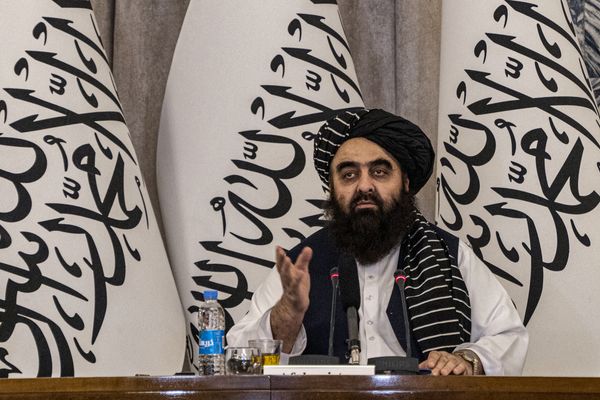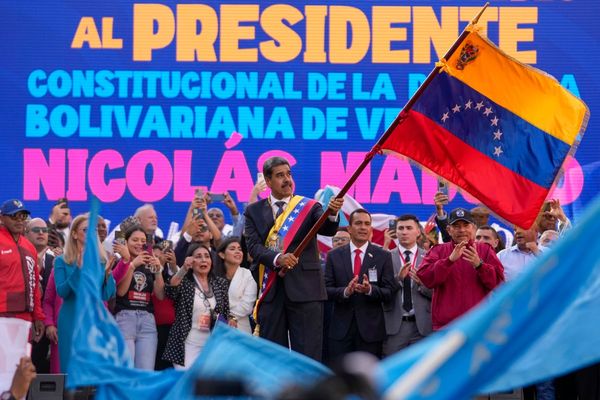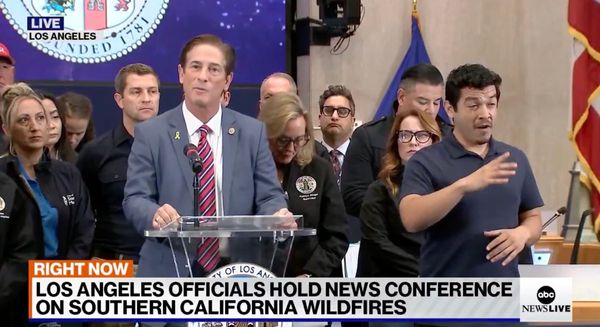Ukraine’s president, Volodymyr Zelenskiy, has accused Russia of being a “terrorist state” after its tanks prevented a delivery of food, water and medicine to the besieged city of Mariupol, and said Moscow was capable of chemical weapon attacks.
As Russian forces appeared to be regrouping in order to encircle Kyiv and the US planned to ratchet up the economic pressure on Vladimir Putin, Zelenskiy tried to rally Ukrainians with another video address late on Thursday condemning Moscow’s relentless assault on cities.
“This is outright terror ... from experienced terrorists,” he said of the alleged attack on the aid convoy. “The world needs to know this. I have to admit it – we are all dealing with a terrorist state.
“They did it deliberately, they knew what they were blowing up, they have an order to keep the city a hostage, abuse it and bomb it constantly, and shell it.”
More than 400,000 people remain trapped in Mariupol, which is surrounded by Russian forces, and basic supplies are running out. Some 200,000 are believed to want to leave amid a relentless Russian artillery onslaught but have not been able to do so despite the daily declaration of humanitarian corridors.
Mariupol’s mayor, Vadym Boichenko, said Russia was targeting residential areas “every 30 minutes”. At least 1,207 people have died although the real figure is believed to be much higher because residents cannot leave their homes to retrieve dead bodies from the streets.
Zelenskiy said no one had been able to escape the city on Thursday, although 100,000 had managed to leave other under-fire cities such as Irpin, Sumy and Hostomel in the past two days.
Russia has called a meeting of the UN security council on Friday to discuss what it claims are US plans to use biological weapons in Ukraine. But Zelenskiy denied any such tactic and said the claim showed it was Russia that planned to use chemical weapons. “This makes me really worried,” Zelenskiy said, “because we’ve been repeatedly convinced: if you want to know Russia’s plans, look at what Russia accuses others of.”
In a potentially significant military development, satellite images released by the US company Maxar Technologies on Thursday appeared to show that the large Russian military convoy last seen north-west of Kyiv had largely dispersed and redeployed. Maxar said its pictures showed that armoured units had fanned out through towns and forests in the area, with artillery pieces moved into potential firing positions.
A US defence official cited by CNN said that Russian forces had moved 5km (about 3 miles) closer to Kyiv, despite Ukrainians fighting back “very, very well” around the capital city. UK defence intelligence agreed that Russia was “likely” trying to reset for an assault on Kyiv.
The Ukrainian military said in its daily operational report on Friday morning that Russian troops had dispersed to regroup and replenish supplies.
Attacks appeared to be intensifying in western Ukraine with air-raid sirens heard in Lviv, explosions reported in Lutsk, and bombing in Ivano-Frankivsk. Dnipro, a major stronghold in central-eastern Ukraine, suffered air strikes on Friday morning, leaving at least one person dead, state emergency services said.
The strike in Lutsk targeted an airfield according to city’s mayor, Igor Polishchuk, who urged his citizens to take cover in a Facebook post early on Friday.
US president Joe Biden will announce another ratcheting up of the economic pressure on Friday when he calls for the end of normal trade relations with Russia. This measure, which is likely to be rubber-stamped and passed into law by Congress, will make Russia a pariah in the world economy in the same category as Cuba and North Korea. It could lead to increased tariffs on Russian goods and will remove what in international trade is termed “most favoured nation status” .
It follows the decision by Biden and British prime minister Boris Johnson this week to ban oil imports from Russia into their countries as they attempt to increase already crippling pressure on Russia brought on by its exclusion from global financial markets.
The price of oil slipped back again on Friday and is set to record its biggest weekly drops since November after see-sawing on fears that more countries would ban Russian imports, balanced by the growing prospect that other big producers could bring on more supply.
Brent crude, the international benchmark, fell 0.67% to $108.60 at 2am GMT after dropping 1.6% in the previous session. US West Texas intermediate crude fell 0.13% to $105.88 a barrel, following a 2.5% decline on Thursday.
Outlawing all US trade with Russia would deepen the already serious economic problems facing Putin’s regime.
Earlier on Thursday, the head of the International Monetary Fund, Kristalina Georgieva, said Russia was “moving into a deep recession”, with massive depreciation of the rouble and sinking purchasing power for its citizens. A debt default was no longer “an improbable event”, she said.
A stream of leading international companies such as Apple, Shell, Ikea and McDonald’s have pulled out of Russia, but the Kremlin is threatening to retaliate by seizing corporate assets.
European Union leaders meeting at Versailles to discuss the Ukraine crisis said in a statement on Thursday night that Russia was “inflicting unspeakable suffering on the Ukrainian population” and called for an immediate and unconditional withdrawal of forces.
They “acknowledged the European aspirations” of Ukraine and agreed to support Ukraine in “pursuing its European path”. They also praised Ukraine’s courageous resistance and promised “we will not leave them alone”.
Many east European member countries such as Estonia and Lithuania have called for Ukraine to be fast-tracked into the 27-member club. But the careful language of the statement stopped a long way short of any hard commitments and reflected unease in western countries such as France, Spain and the Netherlands about any rapid admission.
“What’s important is that Ukraine has asked to be member of the EU,” said Dutch prime minister Mark Rutte. “There is no fast-track procedure to become a member of the EU.”
Zelenskiy attempted to keep the pressure up on the EU, however, saying in his address that he believed the Ukrainian people “have done everything to be welcomed” into the European club.
“This is the final exam for Europe,” he said, adding that ordinary people in Europe had shown their support for Ukraine by protesting in the streets, and that “they would definitely choose Ukraine”.







